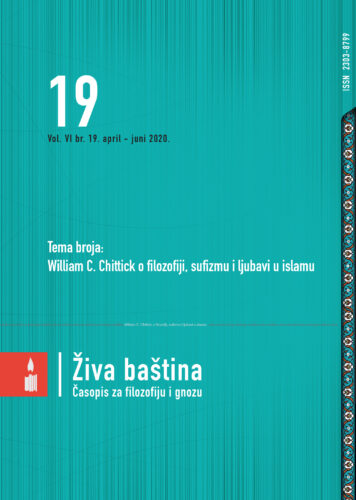UDK 28:1]
Na samom početku autor razmatra vezu filozofije s islamskom tradicijom prikazujući važna filozofska pitanja u njoj. Zatim govori o kvalitetu i kvantitetu tvrdeći da je islamska misaona tradicija uvijek ustrajavala na prvom, dok moderno scijentističko mišljenje insistira na potonjem, šire govoreći u sljedećem potpoglavlju o osnovnim kvalitetima. Nakon toga, u okviru ontološkog razmatranja, prikazuje odnos bitka i nalaženja koji je utjelovljen u pojmu wujūd. U narednom dijelu se bavi psihologijom, konkretnije, dušom i intelektom, da bi kasnije prešao na kosmologiju usredsređujući se na Ishodište i Povratak. Potom se na hijerarhijski način govori o stepenima ljudske mogućnosti pri čemu se čovjek može vinuti u takve visine da postane potpuno ljudsko biće. U posljednjem potpoglavlju se prikazuje antropokosmička vizija koja je posve nasuprot modernom naučnom svjetonazoru. Također, vrijedi kazati da se u ovome radu ne izostavlja sveukupni značaj etike. Ovdje se razmatra islamska filozofija u ogledalu Baba Afdalovih učenja, a koji je, prema autorovom mišljenju iznesenom na drugim mjestima, najvažniji islamski filozof i ličnost koja zapravo ovaploćuje islamsku filozofsku tradiciju. Sve u svemu, ovo poglavlje iz Chittickove knjige The Heart of Islamic Philosophy oštroumno nudi odgovor na pitanje: šta je islamska filozofija?
Abstract
The Worldview of Islamic philosophy
William C. Chittick
At the very beginning, the author discusses philosophy’s relation to the Islamic tradition, presenting the important philosophical questions within it. After that, he discusses the quality and quantity, claiming that the Islamic intellectual tradition always insisted on the former, while the modern scientistic thinking insists on the latter, whereupon the basic qualities are discussed more widely in the next subchapter. Afterwards, within the ontological discussion, he presents the relation between existence and finding, which is embodied in the notion of wujūd. In the next part, he engages with psychology, more specifically with the soul and intellect, only to move later to cosmology, focusing on the Origin and the Return. Afterwards, the paper discusses the degrees of human potentiality in a hierarchical order, whereupon a human can soar to such heights to become a complete human being. In the last subchapter the anthropocosmic vision, which is completely contrary to the modern scientific worldview, is presented. Also, it is noteworthy that this paper does not neglect the overall importance of ethics. The paper discusses the Islamic philosophy in the reflection of Bābā Afdal’s teachings who, according to the author’s opinion expressed in other works, is the most significant Islamic philosopher and a person who in fact embodies the Islamic philosophical tradition. All in all, the chapter of Chittick’s book The Heart of Islamic Philosophy shrewdly offers an answer to the question: What is Islamic philosophy?
Keywords: Islamic philosophy, quality, quantity, scientism, ontology, existence, finding, wujūd, psychology, soul, intellect, cosmology, Origin, Return, hierarchy, human potentiality, complete human being, anthropocosmic vision, ethics, Bābā Afdal.
[tags]

